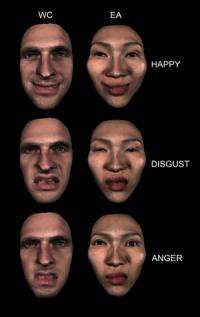April 17, 2012 report
Group finds facial expressions not as universal as thought

(Medical Xpress) -- For most of history, people have assumed that facial expressions are generally universal; a smile by someone of any cultural group generally is an expression of happiness or pleasure, for example. This whole line of thinking was backed up by Charles Darwin who proposed that all humans have six basic facial expressions, which correspond to six general types of emotions: anger, sadness, happiness, fear, disgust and surprise. Unfortunately, new research by a team looking into whether this common assumption is true has found, as they discuss in their paper published in the Proceedings of the National Academy of Sciences, that such perceptions are likely distorted by the fact that most studies on the subject don’t look at the differences between cultures, and that when subjected to study, don't appear to hold up under scrutiny.
After perusing available literature on the subject, the team began to suspect that something was amiss. Virtually every study they encountered focused on the various facial features people present during different emotional states, rather than comparing such expressions between cultures. Thus to find out if there are differences between cultures the team had to conduct an experiment of their own.
Rather than conduct an expensive and time consuming comparative survey, the team instead built a simple computer application that was capable of displaying animated faces on a computer screen capable of showing up to 4800 different facial expressions. For their experiment, they created one group of faces that looked western, and another that looked Asian. Then, they had volunteers look at the faces and offer their opinions of what the facial expressions meant.
To no one’s surprise, when the volunteers were westerners looking at expressions on faces of either culture, they tended to follow along with Darwin’s assumptions. But when the volunteers were non-westernized Asians, their view of what the expressions represented tended to be slightly different from those of westerners, particularly when looking at faces that were supposed to represent fear, surprise anger or disgust. This, the researchers say, is likely due to cultural based connections between emotions such as shame, guilt or pride which can result in people putting on a different face than would those from other cultures. In Asian cultures, they say, more use is made of subtle widening or narrowing of the eyes, for example.
While the team did find that general facial expressions such as those of people smiling or laughing appear to be universal, they note that others are not so clear cut and that the underlying assumption that facial expressions are universal is simply not true.
More information: Facial expressions of emotion are not culturally universal, PNAS, Published online before print April 16, 2012, doi: 10.1073/pnas.1200155109
Abstract
Since Darwin’s seminal works, the universality of facial expressions of emotion has remained one of the longest standing debates in the biological and social sciences. Briefly stated, the universality hypothesis claims that all humans communicate six basic internal emotional states (happy, surprise, fear, disgust, anger, and sad) using the same facial movements by virtue of their biological and evolutionary origins [Susskind JM, et al. (2008) Nat Neurosci 11:843–850]. Here, we refute this assumed universality. Using a unique computer graphics platform that combines generative grammars [Chomsky N (1965) MIT Press, Cambridge, MA] with visual perception, we accessed the mind’s eye of 30 Western and Eastern culture individuals and reconstructed their mental representations of the six basic facial expressions of emotion. Cross-cultural comparisons of the mental representations challenge universality on two separate counts. First, whereas Westerners represent each of the six basic emotions with a distinct set of facial movements common to the group, Easterners do not. Second, Easterners represent emotional intensity with distinctive dynamic eye activity. By refuting the long-standing universality hypothesis, our data highlight the powerful influence of culture on shaping basic behaviors once considered biologically hardwired. Consequently, our data open a unique nature–nurture debate across broad fields from evolutionary psychology and social neuroscience to social networking via digital avatars.
© 2012 Medical Xpress




















